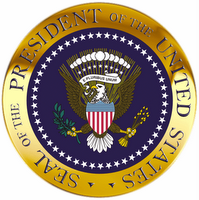Bending the Third Rail
Because We Should, We Can, We Do
Cost of the War in Iraq
(JavaScript Error)
Friday, September 08, 2006
Failed Presidency
 Not a new or unexpected topic, eh?
Not a new or unexpected topic, eh?But I've been thinking about this issue lately. I recently finished the book, "Founding Brothers" by Joseph J. Ellis. It's a Pulizer Prize winning series of essays on relationships and events after the ratification of the Constitution and prior to the deaths of John Adams and Thomas Jefferson. The book is a good read .... both educational and entertaining, particularly the essay discussing the duel between Aaron Burr and Alexander Hamilton in which Hamilton was killed. Much of the book centers on the trials and tribulations of the Washington, Adams, and Jefferson administrations early in the new Republic.
One thing I found of particular interest was the metamorphisis of a politician after becoming President. Even in the earliest administrations, men who sought the office often did so for very personal and often vain reasons. The original template of statesman above politics as President set by Washington was quickly replaced by partisan politics and President as party leaders. Yet one thing remained clear. Once in office past the training period, Presidents grow in the job to transcend politics.
I know I know. Politics never really gives way completely. But quality Presidents have always felt .... and responded to ... the representative weight of all voters and the best interests of the Republic. This select group of individuals who attain the office have all faced decisions at times where the welfare of the whole country was at odds with partisan political considerations. Beginning with Washington, but particularly noteworthy from the Jefferson administration forward, the tendency to take the job seriously as the person who is the only true, single, representative of the people of the United States (and not the head of a political party) has been relatively constant. At least in most Presidents.
Which brings me to Bush.
The biggest single failure of George Bush is that his superficiality, narcissism and lack of intellectual curiousity have prevented him from feeling and responding to the weight of the job. Bush has never risen above the role of party leader implementing political considerations. Despite his (and Karl Rove's) best efforts to portray the President in the mold of Lincoln or Truman, being willing to do what's best for the country despite partisan sentiments, the actions of Bush prove conclusively that he has been unwilling to feel the diverse demands of the job. Instead, he has stubbornly implemented that distinctive nutbar wing of the Republican Party, neoconism, to it's max and to our detriment.
With any good luck, and for the sake of the nation's future, Bush will go down in history as the most superficial of Presidents who's lack of ability and depth caused great harm. If we are lucky, he will be the future template for how not to implement the job of President. The U.S. has survived bad Presidents before and recovered. All through history it seems the Republic has been on the brink of disintegration only to be rekindled by the voters. Let the time begin for rekindling starting with the November elections in which our core values can be reinvigorated.
0 Comments:
About Me
- Name: Greyhair
- Location: Wine Country, California
I'm a very lucky person with every allergy known to man but still happy to be enjoying a wonderful life living in the best place in the world!
Blogroll
The Big PictureBillmon
Blah3.com
Born at the Crest of Empire
Eric Alterman
Eschaton
FireDogLake
Feingold's Blog
Dan Froomkin
The Huffington Post
Hullabaloo
The Illustrated Daily Scribble
Jesus General
Juan Cole
Matilda's Advice and Rants
Mia Culpa
MsJan Quilts
Needlenose
The Oil Drum
Political Animal
Political Wire
Spooks of the Ozarks
Talk About Corruption
TalkLeft
Think Progress
War and Peace
The Washington Note